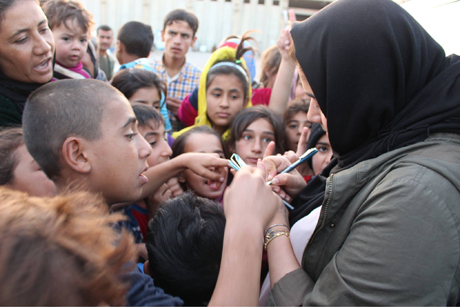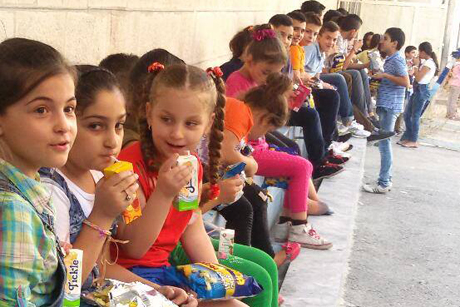Keep us mindful that at any moment you may ask of us an accounting of our lives;
help us to love you and love one another in all that we do,
and so clothe us with your light that we may bring hope to the places of dread,
through Jesus our Savior. Amen. (adapted from Rev. Jennifer Phillips)
Do not feed the fears.
A picture has been making the rounds on the different social media I use. And I agree with it. Don’t feed the fears. It seems like there are too many people who like to try to make us fearful. I believe one way we counteract this, is by our interactions with others.
A friend told about his experience on his Facebook page on Thanksgiving (with his permission) he wrote this: “I was sitting by myself in Sultanahmet Square in Istanbul around a beautiful fountain. A man came up to me trying to goad me into conversation about buying a rug. I politely rejected the sales pitch but started asking him about himself. It turned out he was a native Kurd who had fled the fighting in his home town near the Syrian border. As we talked, I noticed his face. Half of it had been blown off in an explosion, and in addition to the disfigurement, he had a plastic ear taped to the side of his head. It was hard to look at him - because there was so much pain in what was left.What kind of people do we want to be? My friend’s question sat with me even as it brought me hope that our interactions might help us with our fears. The readings for today try to address the fear.
After he left I sat there thinking about our conversation. And how I had grown up in a middle-class neighborhood, in a safe city, with no war, no forced conscription, no bombs, no drones overhead, no food shortages, no rubble to pick through, no crazy death cults rounding up my neighbors. I grew up with plenty to eat, friends to play with, teachers who cared about me, and doctors to heal.
The world's not the same place. But the thing I see that has changed the most is our attitudes toward those who have less. And how our own fears have made us less than the people that we were. What kind of people do we want to be?” {Eric W. – Facebook 11/26/15}
The prophet Jeremiah reminds us that a righteous branch will spring forth, what God has promised will come to pass, justice will be done. The Letter to the Thessalonians reminds us to love one another and that God will strengthen our hearts. Our first two readings tell us that even during our toughest days, to hold on and see things through! What kind of people do we want to be? Living with such hope in our lives.
Sadly, everyday news seems to intrude upon our lives. The shooting at a Planned Parenthood Clinic, wounding 9, killing 3 including a police officer, helps to feed our fears. A bombing overseas, news of terrorism both domestic and foreign seems to be part of our daily bread.
Jesus said, “There will be signs in the sun, the moon, and the stars, and on the earth distress among nations confused by the roaring of the sea and the waves. People will faint from fear and foreboding of what is coming upon the world, for the powers of the heavens will be shaken.”Jesus knows about the times we are living, because they are not unlike his own experience living under Roman occupation. But Jesus tells us not to fear. “Now when these things begin to take place, stand up and raise your heads, because your redemption is drawing near."
Our time is not to cower and fear, but to stand up, for our salvation is close by. Even still, we need to be ready says Jesus.
“Be on guard so that your hearts are not weighed down with dissipation and drunkenness and the worries of this life, and that day catch you unexpectedly, like a trap. For it will come upon all who live on the face of the whole earth.”
We all will face our fears. We can try to dull it by indulging in actions that allow the worries of life to control us. We can try to ignore it but fear is powerful and it so often casts out the love we want to share. Be on guard, says Jesus. What kind of people do we want to be?
Julian of Norwich lived in the fourteenth century in England and she lived in a fearful time: war with France, unsafe travel by land or sea, outbreaks of disease that decimated their livestock, recurring crop failures resulting in famines, both of which they relied on to feed themselves and the Great Plague that killed its victims, without warning, often within days.
In the midst of this, Julian advised those who visited her and in her writings, to avoid the fears of life that whirls around us all the time, but instead, have “Reverent Dread” or the term I like is “holy awe.” In Julian’s own words:
“And thus we shall in love be homely and near to God, and we shall in holy awe [reverent dread] be gentle and courteous towards God... We should desire then of our lord God to fear him reverently and to love him humbly and to trust in him mightily... For the more that we trust and the mightier, the more we please and worship our lord in whom we trust…And therefore we need greatly to pray to our lord of grace, that we may have this holy awe [reverent fear] and humble love by his gift, in heart and in work, for without this no man may please God.” (from Chapter 24 of Julian's Gospel: Illuminating the Life & Revelations of Julian of Norwich)In the words of Veronica Mary Rolf, “Julian is advising us not to go about in fear of what might happen but rather to concentrate all our energies on loving and trusting God "mightily" in all that we think and do and say. In God's love for us is our truest security and most reliable protection. And in our reverent fear of God -- and only God -- is our courage to live in freedom.”
What kind of people do we want to be? In this Advent, may we be a people of hope, a people of holy awe, who “hold our heads high amid the swirl of fear and violence around us” as we share the love and grace of God to cast away the works of darkness. Amen.
Follow-Up with these Blogs:
What We Should Fear
Dealing with Fear









